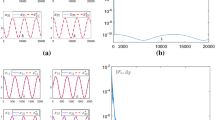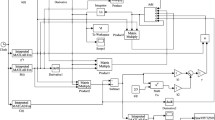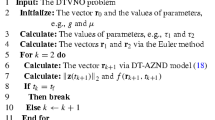Abstract
Several improvements of the Zhang neural network (ZNN) dynamics for solving the time-varying matrix inversion problem are presented. Introduced ZNN dynamical design is termed as ZNN models of the order p, \(p\ge 2\), and it is based on the analogy between the proposed continuous-time dynamical systems and underlying discrete-time pth order hyperpower iterative methods for computing the constant matrix inverse. Such ZNN design is denoted by \(\hbox {ZNN}_H^p\). Particularly, the \(\hbox {ZNN}_H^2\) design coincides with the standard ZNN design. Moreover, \(\hbox {ZNN}_H^3\) design represents a time-varying generalization of the previously defined ZNNCM model. In addition, an integration-enhanced noise-handling \(\hbox {ZNN}_H^p\) model, termed as \(\hbox {IENHZNN}_H^p\), is introduced. In the time-invariant case, we present a hybrid enhancement of the \(\hbox {ZNN}_H^p\) model, shortly termed as \(\hbox {HZNN}_H^p\), and investigate it theoretically and numerically. Theoretical and numerical comparisons between the improved and standard ZNN dynamics are considered.











Similar content being viewed by others
Explore related subjects
Discover the latest articles, news and stories from top researchers in related subjects.References
Chen K (2013) Recurrent implicit dynamics for online matrix inversion. Appl Math Comput 219:10218–10224
Chen K, Yi C (2016) Robustness analysis of a hybrid of recursive neural dynamics for online matrix inversion. Appl Math Comput 273:969–975
Chen D, Li S, Wu Q (2019) Rejecting chaotic disturbances using a super-exponential-zeroing neurodynamic approach for synchronization of chaotic sensor systems. Sensors 19:74. https://doi.org/10.3390/s19010074
Climent J-J, Thome N, Wei Y (2001) A geometrical approach on generalized inverses by Neumann-type series. Linear Algebra Appl 332–334:533–540
Guo D, Nie Z, Yan L (2016) Theoretic alanalysis, numerical verification and geometrical representation of new three-step DTZD algorithm for time-varying nonlinear equations solving. Neurocomputing 214:516–526
Jin L, Zhang Y, Li S (2016) Integration-enhanced Zhang neural network for real-time-varying matrix inversion in the presence of various kinds of noises. IEEE Trans Neural Netw Learn Syst 27(12):2615–2627
Jin L, Zhang Y, Qiao T, Tan M, Zhang Y (2016) Tracking control of modified Lorenz nonlinear system using ZG neural dynamics with additive input or mixed inputs. Neurocomputing 196:82–94
Jin L, Li S, Liao B, Zhang Z (2017) Zeroing neural networks: a survey. Neurocomputing 267:597–604
Li J, Mao M, Uhlig F, Zhang Y (2018) Z-type neural-dynamics for time-varying nonlinear optimization under a linear equality constraint with robot application. J Comput Appl Math 327:155–166
Li J, Zhang Y, Mao M (2019) Continuous and discrete Zeroing Neural Network for different-level dynamic linear system with robot manipulator control. IEEE Trans Syst Man Cybern Syst https://doi.org/10.1109/TSMC.2018.2856266
Li S, Chen S, Liu B (2013) Accelerating a recurrent neural network to finite-time convergence for solving time-varying Sylvester equation by using a sign-bi-power activation function. Neural Process Lett 37:189–205
Li S, Li Y (2014) Nonlinearly activated neural network for solving time-varying complex Sylvester equation. IEEE Trans Cybern 44:1397–1407
Li S, Zhang Y, Jin L (2016) Kinematic control of redundant manipulators using neural networks. IEEE Trans Neural Netw Learn Syst 28:2243–2254. https://doi.org/10.1109/TNNLS.2016.2574363
Li S, Zhou M, Luo X, You Z (2017) Distributed Winner-take-all in dynamic networks. IEEE Tran Autom Control 62(2):577–589
Li S, He J, Rafique U, Li Y (2017) Distributed recurrent neural networks for cooperative control of manipulators: a game-theoretic perspective. IEEE Trans Neural Netw Learn Syst 28(2):415–426
Li S, Wang H, Rafique U (2017) A novel recurrent neural network for manipulator control with improved noise tolerance. IEEE Trans Neural Netw Learn Syst 29:1908–1918. https://doi.org/10.1109/TNNLS.2017.2672989
Li W, Li Z (2010) A family of iterative methods for computing the approximate inverse of a square matrix and inner inverse of a non-square matrix. Appl Math Comput 215:3433–3442
Liao B, Zhang Y (2014) Different complex ZFs leading to different complex ZNN models for time-varying complex generalized inverse matrices. IEEE Trans Neural Netw Learn Syst 25:1621–1631
Liu X, Jin H, Yu Y (2013) Higher-order convergent iterative method for computing the generalized inverse and its application to Toeplitz matrices. Linear Algebra Appl 439:1635–1650
Miao P, Shen Y, Huang Y, Wang Y-W (2015) Solving time-varying quadratic programs based on finite-time Zhang neural networks and their application to robot tracking. Neural Comput Appl 26:693–703
Oppenheim AV, Willsky AS (1997) Signals and systems. Prentice-Hall, Englewood Cliffs
Stanimirović PS, Katsikis V, Li S (2019) Integration enhanced and noise tolerant ZNN for computing various expressions involving outer inverses. Neurocomputing 329:129–143
Stanimirović PS, Katsikis VN, Li S (2018) Hybrid GNN-ZNN models for solving linear matrix equations. Neurocomputing 316:124–134
Stanimirović PS, Živković IS, Wei Y (2015a) Recurrent neural network approach based on the integral representation of the Drazin inverse. IEEE Trans Neural Netw Learn Syst 27:2107–2131
Stanimirović PS, Živković IS, Wei Y (2015b) Recurrent neural network for computing the Drazin inverse. IEEE Trans Neural Netw Learn Syst 26:2830–2843
Stojanovic I, Stanimirovic P, Živkovic IS, Gerontitis D, Wang X-Z (2017) ZNN models for computing matrix inverse based on hyperpower iterative methods. Filomat 31:2999–3014
Wang J (1993) A recurrent neural network for real-time matrix inversion. Appl Math Comput 55:89–100
Wang S-D, Kuo T-S, Hsu C-F (1986) Trace bounds on the solution of the algebraic matrix riccati and lyapunov equation. IEEE Trans Autom Control AC–31:654–656
Wang X-Z, Stanimirović PS, Wei Y (2018) Complex ZFs for computing time-varying complex outer inverses. Neurocomputing 275:983–1001
Wang X-Z, Wei Y, Stanimirović PS (2016) Complex neural network models for time-varying Drazin inverse. Neural Comput 28:2790–2824
Weiguo L, Juan L, Tiantian Q (2013) A family of iterative methods for computing Moore-Penrose inverse of a matrix. Linear Algebra Appl 438:47–56
Zhang Y, Ge SS (2005) Design and analysis of a general recurrent neural network model for time-varying matrix inversion. IEEE Trans Neural Netw 16:1477–1490
Zhang Y, Guo D (2015) Zhang functions and various models. Springer, Heidelberg
Zhang Y, Ma W, Cai B (2009) From Zhang neural network to Newton iteration for matrix inversion. IEEE Trans Circuits Syst I Regul Pap 56:1405–1415
Zhang Y, Qiu B, Jin L, Guo D, Yang Z (2015) Infinitely many Zhang functions resulting in various ZNN models for time-varying matrix inversion with link to Drazin inverse. Inf Process Lett 115:703–706
Zhang Y, Shi Y, Chen K, Wang C (2009) Global exponential convergence and stability of gradient-based neural network for online matrix inversion. Appl Math Comput 215:1301–1306
Zhang Y, Yang Y, Tan N, Cai B (2011) Zhang neural network solving for time-varying full-rank matrix Moore-Penrose inverse. Computing 92:97–121
Zhang Y, Qiu B, Liao B, Yang Z (2017) Control of pendulum tracking (including swinging up) of IPC system using zeroing-gradient method. Nonlinear Dyn 89:1–25
Zhang Z, Chen S, Li S (2018) Compatible convex-nonconvex constrained QP-based dual neural networks for motion planning of redundant robot manipulators. IEEE Trans Control Syst Technol 27:1250–1258
Zhang Z, Fu T, Yan Z, Jin L, Xiao L, Sun Y, Yu Z, Li Y (2018) A varying-parameter convergent-differential neural network for solving joint-angular-drift problems of redundant robot manipulators. IEEE Trans Mechatron 23:679–689
Zhang Z, Lu Y, Zheng L, Li S, Yu Z, Li Y (2018) A new varying-parameter convergent-differential neural-network for solving time-varying convex QP problem constrained by linear-equality. IEEE Trans Autom Control 63:4110–4125
Zhang Z, Zheng L (2018) A complex varying-parameter convergent-differential neural-network for solving online time-varying complex Sylvester equation. IEEE Trans Cybern 49(10):3627–3639
Zhang Z, Zheng L, Guo Q (2018d) A varying-parameter convergent neural dynamic controller of multirotor UAVs for tracking time-varying tasks. IEEE Trans Veh Technol 67:4793–4805
Zhang Z, Zheng L, Weng J, Mao Y, Lu W, Xiao L (2018e) A new varying-parameter recurrent neural-network for online solution of time-varying Sylvester equation. IEEE Trans Cybern 48:3135–3148
Zielke G (1975) Testmatrizen mit freien Parametern. Computing 15:87–103
Živković IS, Stanimirović PS (2017) Matlab simulation of the hybrid of recursive neural dynamics for online matrix inversion. Facta Univ Ser Math Inform 32:799–809
Zivković IS, Stanimirović PS, Wei Y (2016) Recurrent neural network for computing outer inverses. Neural Comput 28(5):970–998
Author information
Authors and Affiliations
Corresponding author
Additional information
Publisher's Note
Springer Nature remains neutral with regard to jurisdictional claims in published maps and institutional affiliations.
Predrag S. Stanimirović gratefully acknowledge support from the Ministry of Education and Science, Republic of Serbia, Grant No. 174013, and from the bilateral project between China and Serbia “The theory of tensors, operator matrices and applications (No. 4-5)”.
Rights and permissions
About this article
Cite this article
Stanimirović, P.S., Katsikis, V.N. & Li, S. Higher-Order ZNN Dynamics. Neural Process Lett 51, 697–721 (2020). https://doi.org/10.1007/s11063-019-10107-8
Published:
Issue Date:
DOI: https://doi.org/10.1007/s11063-019-10107-8




